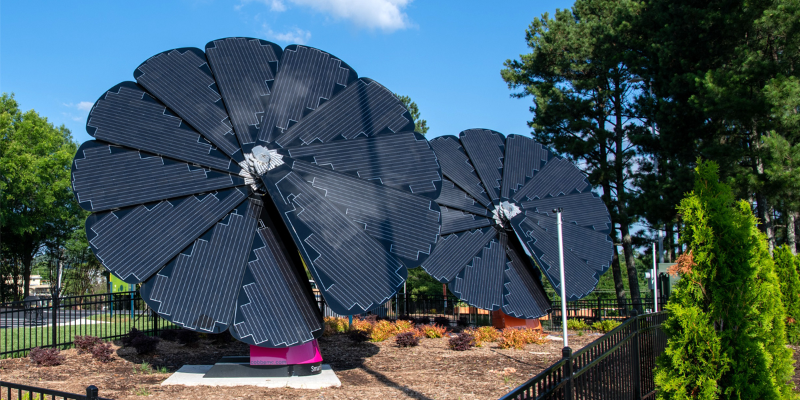Georgia Co-op Prepares for Campus Microgrid with Smartflowers

Cobb Electric Membership Corp. planted three Smartflowers in its Solar Flower Garden located on its headquarters campus in Marietta, Georgia. The Smartflowers are part of the first phase of a larger solar and renewable project that will provide a research tool for staff to better understand use cases, limitations and benefits while demonstrating the cooperative’s commitment to renewable energy.
“There is a tremendous amount of interest in solar and renewable energy in our community and our members look to us to be a trusted energy adviser,” Cobb EMC CEO Peter Heintzelman said. “Since we already have excellent relationships with our solar, battery storage and Smartflower partners, we were excited to put them on display for our community to experience in person and learn about renewable energy.”
Smartflowers Help Raise Member Awareness About Cobb’s Sustainability Efforts
The Smartflowers can provide 13,140 kWh of energy and are a focal point for community events where members can increase their awareness of the solar technology and the cooperative’s sustainability efforts. The Solar Flower Garden includes educational and social media-friendly signage as well as a DC fast electric vehicle charger. Cobb EMC has a fourth Smartflower on a trailer for offsite educational events and demonstrations for commercial and industrial members.
The Smartflowers combine with campus building rooftop solar arrays and solar car canopies that can produce nearly 2.4 million KWh per year, along with a 1 MW battery that can provide 4 MWh of reserve capacity. The combined solar and battery assets will enable Cobb EMC staff to calculate the actual KWh of energy generation that will contribute to its next phase of the project following a year of commercial operation—a campus microgrid.
Cobb Plans to Fully Implement Microgrid Strategy in 2021
“Being a trusted energy adviser means you have experience and knowledge on a subject, so having our own battery and solar assets and the experience managing them is key when we are advising our members,” Heintzelman explained. “Phase two of our solar and renewable project will make our campus a microgrid that will be able to disconnect to an ‘island mode.’ We will then be able to operate autonomously based on physical and economic conditions.”
Cobb EMC plans to release a request for interest this month to determine the exact requirements and equipment needed to fully implement its microgrid strategy in 2021.
“Planning, building and operating our own microgrid will empower us to attract future critical power customers, such as data centers, supporting our future load growth,” Heintzelman added.
Published July 13, 2020, in CFC Solutions News Bulletin.